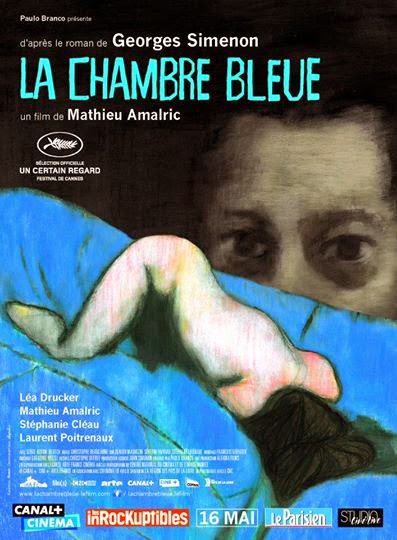Cannes Diary Day 4: Amour Fou & The Blue Room
 Sunday, May 18, 2014 at 10:06AM
Sunday, May 18, 2014 at 10:06AM  Diana Drumm reporting from Cannes...
Diana Drumm reporting from Cannes...
The Blue Room and Amour Fou, two films in the Un Certain Regard section, examine the pitfalls of unrequited romance. A French modern noir, The Blue Room centers on an extramarital affair between a farm equipment rep and a pharmacy employee that leads to a murder investigation. A German Romantic period piece, Amour Fou also centers on an extramarital affair, though this time between poet Heinrich von Kleist and wife of a businessman Henriette Vogel which also leads to violent crime. The former film's narrative goes in and out of its protagonist’s recollections, while the latter follows its protagonist’s determined trajectory. Neither man actually loves his mistress, with one outrightly denying and the other unwilling to admit, but both end linked inextricably to their “beloveds” through tragic means...
The Blue Room
From actor-director Mathieu Amalric (seen most recently as Madame D.’s craze-eyed servant in The Grand Budapest Hotel), the film opens on Julien (Amalric) talking through his affair with Delphine to a police officer. (He thinks they met 8 times in the past 11 months, but how can he be sure? And no, he was not worried by her biting his lip hard enough to bleed…) Sneaking away from their respective spouses to a blue room (hence the title), the two have their way with each other (head’s up: equal opportunity nudity). Julien thinks of their relationship as little more than a few flings, whereas Delphine sees their rendezvous as evidence of a deeper passion and asks him:

If I were suddenly free, could you free yourself, too?”
In a very tricky juggling act, Amalric as both actor and director, reveals enough bits to keep the narrative moving toward its final destination but not enough to show exactly where that is. As Julien’s memories play out onscreen, the audience uncovers the truth behind a few of his white lies, turning him into an unreliable narrator. In his eyes, Delphine goes from amorous conquest to slighted lover to spurned Fatal Attraction-type obsessive with Julien remaining the physically-interested, emotionally-uncaring lover throughout. Testing the audience’s sympathies even more, Lea Drucker brings a charismatic warmth to Delphine, both in her early-on elusive sensuality and her later misguided delusions. From the bedroom to the courtroom, Delphine never changes their story, his and hers, of love hindered by unwise choices and marriages. On the other hand, Julien denounces everything she claims, with his anger boiling over into a eyes-bulging physical attack when she mentions his daughter.
In the end, it doesn’t quite matter who you believe as both Julien and Delphine receive the same fate, to be forever linked together in the annals of French tabloid fodder, both victims of grievous miscommunication.

AMOUR FOU
From director Jessica Hausner (whose Lourdes won Best Feature at Viennale 2009), Amour Fou opens in a 19th-century pastel green foyer with Henriette (Birte Schnoeink, era-appropriately wooden and dainty) telling her old-enough-to-be-her-father husband (Stephan Grossman) about a bizarre Sleeping Beauty-type poem involving a Marquise. Foreshadowing events to come, Henriette becomes infatuated with its author, the equally bizarre Heinrich von Kleister (Christian Friedel) who is doggedly pursuing his own cousin Marie, but to little avail. In his proposal to Marie, the morbid existentialist Heinrich (“I suffer not from death, but life”) jumps the gun on the “till death do us” part of the would-be wedding vows, asking Marie not whether she’d like to marry, but “would you care to die with me?” Thwarted marriage plans behind him, Heinrich sees Henriette as the next best option and Henriette follows at his heels like a spaniel.
Dubbed as a “romantic comedy,” Hausner dabbles in a cold, determined (dare I type German?) humor by way of the Romantic period (with characters repeatedly referencing the French threat of democratic reform and uneducated masses). Whereas Cannes compatriot Mr. Turner breathes full-bodied life into that era, Amour Fou falls flat, resembling an unsuccessful attempt at Wes Anderson in period clothing (pastels, deliberate pacing, deadpan line delivery). The film lacks the warmth necessary for empathy, let alone sympathy, in its characters’ plights. Heinrich’s obsession with death turns from Harold & Maude cute to irritating to cruel as his fickly false treatment of poor Henriette’s affections only gets worse with repetition. Henriette develops a nervous disorder (and possibly a tumor) in pursuit of this pretentious numbskull, disregarding her supportive husband and her young daughter (amour fou's literal translation: "insane love").
As in The Blue Room, they share an infamous tragic fate. In both films, the woman loves the man too much and all four pay the price. But a reverse of sorts of romantic convention: the men are fickle while the women are steady and none are wholly innocent (though both Julien & Heinrich believe themselves blameless). As Shakespeare wrote “Love is not love. Which alters when it alteration finds,” which Delphine and Henriette would have done well to heed.
Cannes Diary: Day 1 Arrival & Opening Night | Day 2 Grace of Monaco | Day 3 Mr Turner & Timbuktu | Day 5? The Homesman Press Conference and The Homesman Review | Day 7 Mommy, Maps to the Stars & Two Days One Night



Reader Comments (3)
Both of these sound interesting too. And that poster for The Blue Room is fantastic.
"Dubbed as a “romantic comedy,” Hausner dabbles in a cold, determined (dare I type German?) humor by way of the Romantic period (with characters repeatedly referencing the French threat of democratic reform and uneducated masses)."
You're allowed to type that. That is what my people do best with their humor.
Not one word about whether The Blue Room is any good? Just a synopsis?